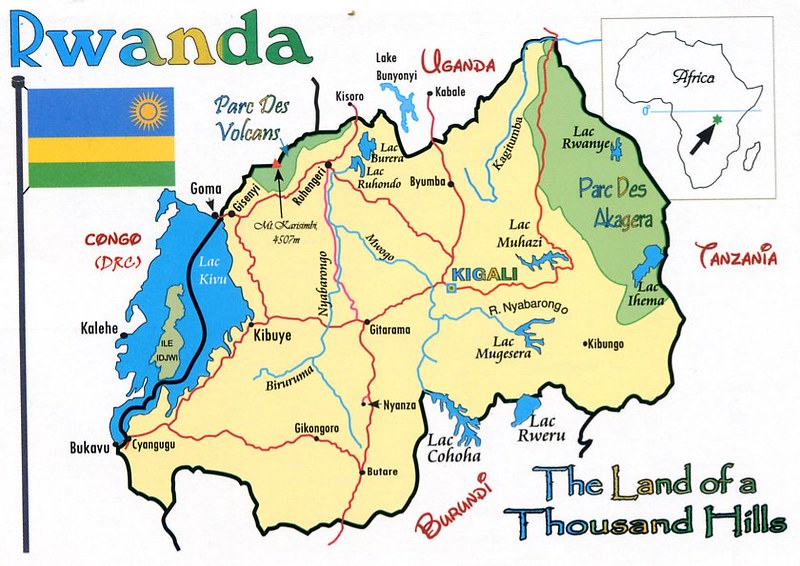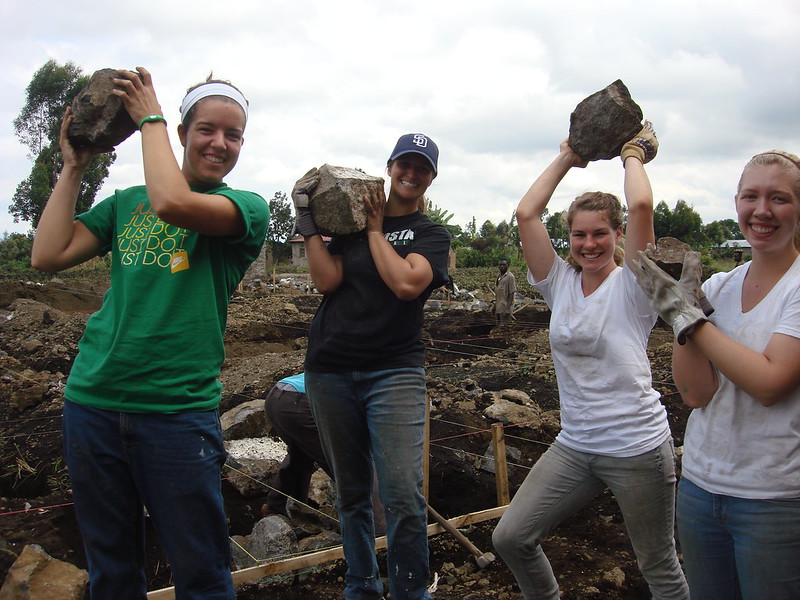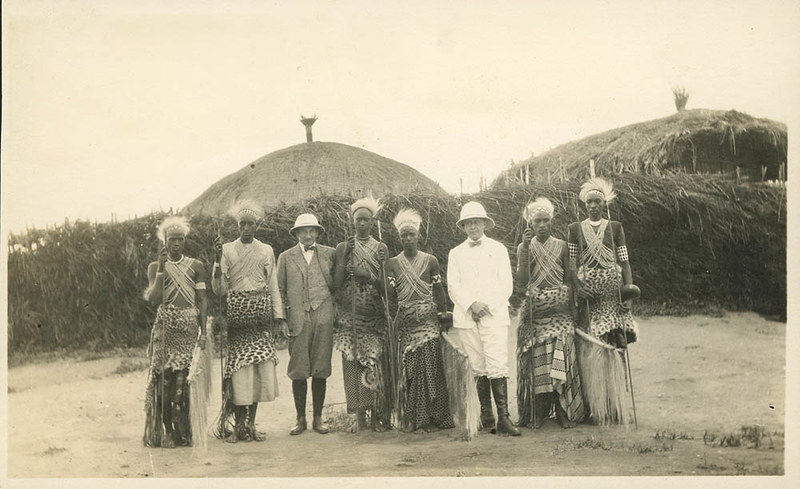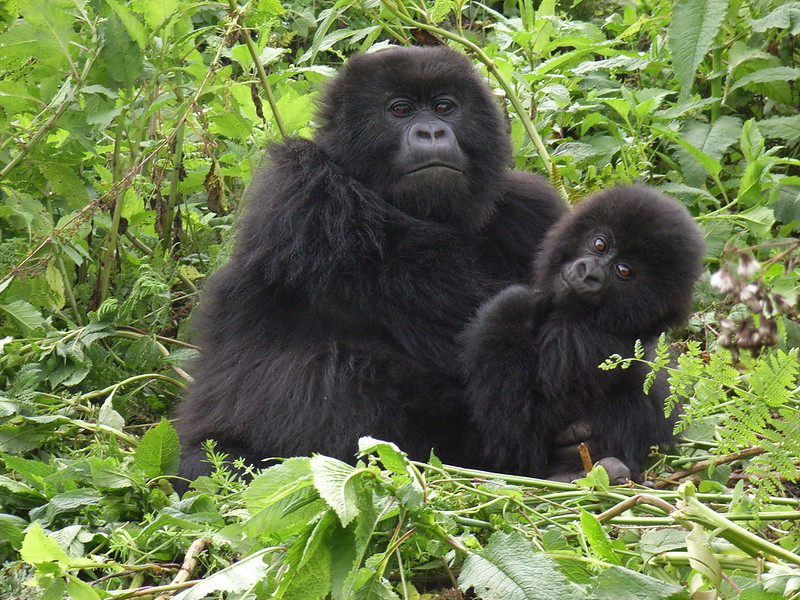Where is Rwanda: History, Location, Map
Where is Rwanda ? Rwanda, a diminutive nation comparable in size to the U.S. state of Maryland, is located south of the Equator in central Africa. The landlocked nation is adjacent to Burundi to the south, Tanzania to the east, Uganda to the north, and the Democratic Republic of the Congo to the west.
Referred to as the “land of a thousand hills,” Rwanda’s terrain predominantly consists of hills and mountains. The Virunga Mountains, situated in the northwest region of Rwanda, encompass the nation’s highest summit, Karisimbi, which ascends to about 15,000 feet.
The Nile and the Congo, two prominent African rivers, traverse Rwanda. Lake Kivu is the largest lake in the country and the sixth largest in Africa, delineating the border between Rwanda and the Democratic Republic of Congo to the west. Lake Kivu reaches a maximum depth of 722 feet (220 meters) beneath the surface. A significant number of individuals reside along the banks of Lake Kivu and engage in fishing its waters.

Rwanda Culture
Rwanda, although one of Africa’s smallest nations, is among the continent’s most densely populated, with roughly one thousand inhabitants per square mile. The Hutu and Tutsi ethnic groups constitute the majority of the nation’s population. The Hutu constitute approximately 85 percent of the population, while the majority of the remainder comprises Tutsis. The predominant faith among both populations is Christianity.
Kigali, the capital, is the largest city in the nation; yet, the majority of Rwandans reside in rural regions. Music and dance are integral components of Rwandan culture in both urban and rural settings. The most renowned dance of Rwanda consists of three components: the intore, signifying the dance of heroes, executed by men; the umushagiriro, or cow dance, done by women; and drumming, conducted on instruments referred to as ingoma.
Typical components of Rwandan cuisine comprise bananas, plantains, sweet potatoes, and beans. Fish preparations, particularly those featuring tilapia, are favored by Rwandans residing in proximity to lakes. The majority of Rwandans consume meat only several times per month.

The Nature of Rwanda
Rwanda, characterized by tropical rainforests, mountain ranges, and volcanoes, is among the most environmentally diverse regions in Africa. The Albertine Rift region of the continent, encompassing a significant portion of western Rwanda, harbors around one-third of Africa’s avian species, 40 percent of its mammals, and 20 percent of its amphibians and flora.
Visitors to Rwanda seek to observe one of the 12 primate species residing in the nation’s national parks. Chimpanzees and many species of monkeys inhabit Nyungwe and Gishwati Mukura National Parks. Volcanoes National Park houses approximately one-third of the global mountain gorilla population and encompasses five of the eight volcanoes in the Virunga Mountains, a range located in East Africa. Akagera National Park, the nation’s sole remaining national park, has black rhinos, hippos, elephants, giraffes, and Rwanda’s national avian symbol: the gold-crested crane.
Government of Rwanda
In 2003, Rwanda enacted a constitution establishing a presidential system of governance. The President of Rwanda functions as the head of state, supervising two governmental entities: the cabinet, which collaborates with the president to formulate policies, and the parliament, which enacts legislation and monitors the actions of both the president and the cabinet.
The nation is presently divided into four provinces, in addition to Kigali, the capital. Each of these five regions is governed by a distinct governor. The president is elected every seven years through the popular vote of Rwanda’s population and appoints the governors of the five provinces. The president possesses extensive powers, including commanding the armed forces, making treaties, and declaring war or situations of emergency.
The economy of Rwanda is predominantly agrarian. Bananas, coffee, tea, and tobacco are significant income crops. The tourism sector is one of the fastest expanding in the country, primarily fueled by people seeking to observe mountain gorillas in their natural environment.
The history of Rwanda
The discord between the Hutu and Tutsi populations significantly shapes Rwanda’s historical narrative. The Hutus initially settled in Rwanda between the 5th and 11th century. The Tutsis came about in the year 1300, some centuries later. Although a minority, the Tutsis subjugated the Hutus and governed Rwanda until the late 19th century.
In the 1890s, Germany annexed Rwanda as a colony. Belgium conquered the territory in 1916, during World War I. Following the conclusion of the war in 1918, Belgium rebranded Rwanda and its adjacent nation of Burundi as the area of Ruanda-Urundi.

The relationship between the Tutsis and Hutus in the early 20th century was tense. A civil conflict commenced between the two ethnic groups in 1959, resulting in thousands of Tutsis seeking refuge abroad. Rwanda proclaimed its independence in 1962 under the leadership of new Hutu authorities.
The Hutus maintained authority until 1990. Subsequently, Tutsi insurgents attacked the nation, initiating another civil conflict. The two factions were in conflict until 1993, when peace efforts commenced. In 1994, a rocket launched by the Tutsis downed the aircraft of the Rwandan president. The president was of Hutu ethnicity. During the subsequent hundred days, the Hutus exacted vengeance by killing 800,000 individuals, a significant number of whom were Tutsis. Millions of Rwandans fled to evade the genocide and widespread massacres.
In the years subsequent to the genocide, numerous refugees ultimately repatriated to their homeland. The United Nations established a court to identify and prosecute individuals involved in the killings, with trials continuing until 2015.

In 2003, Rwanda enacted a new constitution designed to avert the concentration of power within a single ethnic group. Following decades of efforts to recuperate from the 1994 genocide, Rwanda’s economy has improved, and the nation is emerging as a technological hub in Africa. The genocide continues to affect life in Rwanda today; for example, the government has dissuaded residents from overtly identifying as Hutu or Tutsi.
